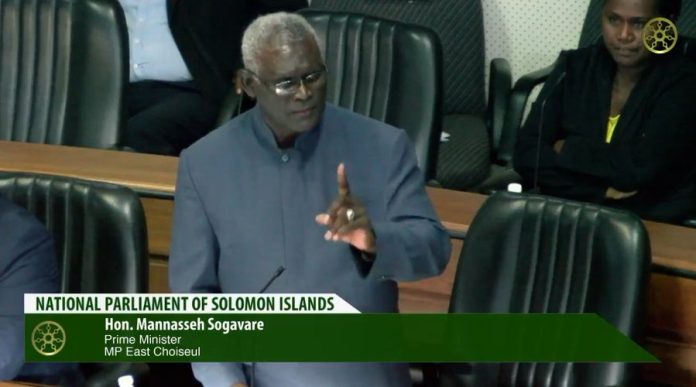The leader of the Solomon Islands survived a no-confidence vote in Parliament on Monday following riots in the capital last month.
Prime Minister Manasseh Sogavare told lawmakers in a fiery 90-minute speech that he’d done nothing wrong and would not bow down to “the forces of evil” or to “Taiwan’s agents.” At one point he picked up his chair and banged it on the Parliament floor to emphasise a point.
Opponents accused him and his government of lying, looting, and using Chinese money to cling to power during a debate over a no-confidence motion brought by opposition leader Matthew Wale.
In the end, Sogavare easily had the numbers, winning 32 votes to 15, with two abstentions.
China, meanwhile, said it was shipping in aid for its citizens caught up in the violence.
Many businesses remained closed in the capital, Honiara, ahead of the vote over concerns that violence could erupt again, leading to an eerie calm.
The riots in Honiara grew from a peaceful protest and highlighted long-simmering regional rivalries, economic problems, and concerns about the country’s increasing links with China. Rioters set fire to buildings and looted stores.
Troops and police from Australia, Papua New Guinea, Fiji, and New Zealand have been helping keep the peace at the request of the Solomon Islands government.
Lawmakers debated the no-confidence motion throughout the day, using a mixture of English, the official language, and the commonly spoken Melanesian pidgin.
The opposition leader used a calm and measured tone that contrasted sharply with that of the prime minister. Wale described a nation plagued by unemployment, exploited resources and “looting at the top.” He said Sogavare had repeatedly lied to lawmakers and to the people.
Wale said he was hesitant to even bring the motion because it “may further add to what are already high levels of anger in certain quarters of our society.”
But Sogavare said he would resist the no-confidence motion just as he’d resisted calls to resign.
“If I resign, sir, it would be a message to our young children and youth, that whenever we are not happy with those in authority, we take the laws into our own hands,” Sogavare said. “This is a very dangerous message to our people and future generations.”
Sogavare said Chinese money was crucial for the nation’s development.
Lawmaker Rick Hounipwela argued that Sogavare needed to go, saying there had been an increase in corruption and that the prime minister was blinded by “anything that glitters.”
“I’m sure he’s very capable of throwing out even China” should a better offer come along, Hounipwela said.
Other lawmakers expressed support for Sogavare.
Health Minister Culwick Togamana said the government had been democratically elected and changing it now would vindicate the rioters, proving that the ends justify the means.
Togamana said evidence of the government’s effectiveness could be seen by the fact there was no community spread of the coronavirus. The Solomon Islands has reported just 20 cases of the virus and no deaths.
The riots and looting targeting Honiara’s Chinatown and downtown precincts erupted 24 November following a protest in the capital by people from the province of Malaita. Police fired tear gas and rubber bullets at the demonstrators, who set fire to a police station and many other buildings.
Critics also blamed the unrest on complaints of a lack of government services and accountability, corruption and Chinese businesses giving jobs to foreigners instead of locals.
Sogavare angered many in 2019, particularly leaders of Malaita, when he cut the country’s diplomatic ties with Taiwan to recognise China instead.
Daniel Suidani, the premier of Malaita, said Friday he thinks the Solomon Islands should partner with Taiwan because they share democratic values.
A notice posted on the website of the Chinese Embassy in Honiara on Monday said members of the Chinese community have been “hit hard by looting and destruction.”
It said the first aid shipment would arrive shortly but gave no details.
“The Embassy of the People’s Republic of China strongly condemns the recent riot in Honiara, which left Chinatown and Chinese-owned shops among other areas in ruins, resulting in huge property loss and social panic,” the embassy statement said.
“Hundreds of Chinese families including elders, kids and women were driven homeless and displaced in distress. There is not any excuse to justify the blatant damage to properties and lives,” it said.
China has said foreign interference factored into the violence, in a reference to the move to recognise Beijing and drop diplomatic relations with Taiwan, the self-governing island that China considers its own territory.
The embassy blamed attempts by outside players to undermine bilateral relations.
Since the establishment of diplomatic relations “our cooperation has achieved more fruitful and tangible outcomes,” it said. “Any attempt to sabotage the relationship is doomed to failure.”
The Solomon Islands has a population of about 700,000 and is located northeast of Australia.
SOURCE: AP/PACNEWS














